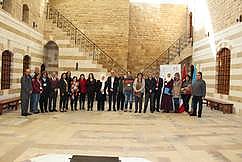Goals
- Train teachers on integrating intangible cultural heritage (ICH) into school courses.
- Test didactic approaches to incorporating ICH through pilot projects with students.
Description
Background
Lebanon participated in the 2009-2012 ‘Mediterranean Living Heritage’ project, which sought to build capacity among Mediterranean countries to develop intangible cultural heritage (ICH) safeguarding projects as they implement the UNESCO Convention for the Safeguarding of the Intangible Cultural Heritage. Following the project, Lebanon’s Ministry of Culture was assisted by the UNESCO Beirut Office in drafting their national cultural policy for safeguarding ICH. The policy underscores the importance of integrating ICH into education, and the Ministry identified a need to develop teaching materials to help fulfil the policy’s goals.
Strategy
This project targeted students and educators at schools that are members of UNESCO’s Associated Schools Project Network (ASPnet) in Lebanon. Teachers across all subjects received training on how to integrate ICH and its relationship to sustainable development into the existing curricula. Training workshops employed a ‘train the trainers’ approach so as to enable the participants to transmit the workshops’ lessons to their colleagues. Selected teachers collaborated with communities and local organizations to develop lessons, conduct community inventory activities and visit cultural practitioners.
This educational programming had various goals: raise students’ awareness of local ICH and its values; communicate why it is important to safeguard; explain the relationship between ICH, sustainable development and local socio-economic welfare; convey their responsibility in continuing the transmission of ICH. A number of teachers carried out educational activities as a pilot project with their students, enabling further refinement of the teaching materials before they become available for use by other educators.
Several coordination meetings were held to identify the target schools and select the teachers to be trained and to participate in the pilot study. The four schools that were part of the project are:
- Dr. Hikmat Sabbagh - Youmna Eid Public High School for Girls - Saida
- Rafic Hariri High School - Saida
- Jezzine Secondary School
- Collège Notre Dame Machmoucheh - Jezzine
Training of trainers

© UNESCO
In December 2018, a workshop was held at the Outreach and Leadership Academy in Saida for 15 science and literature teachers in the secondary cycle in the four selected schools were trained on the key concepts of the intangible cultural heritage and its linkages with the education for sustainable development. They also discussed the modalities for choosing and incorporating the elements of this heritage relevant to sustainable development into their curricula, as well as the elements specific to the local communities that can be used in the different contents of the materials.
A follow-up gathering was also organized in March 2019 in Jezzine, which allowed participants to share experiences and best practices.
School activities
Each school identified one or more ICH elements (see table below) as well as their entry points in the existing curriculum. Based on these entry points, lesson plans and learning activities were developed, including field visits and interviews with practitioners. Details on the project implementations can be found in the project guide.
| School | Class(es) | Subject(s) | Element(s) |
|---|---|---|---|
| Rafic Hariri High School - Saida | Grade 11 | Physics, History, Geography and Sociology, Laboratory | Fishing boat industry, Olive oil soap making, Rituals of the month of Ramadan |
| Dr. Hikmat Sabbagh - Youmna Eid Public High School for Girls - Saida | Grades 6, 7 and 8 (Intermediate cycle) Grades 9, 10 and 11(Secondary cycle) | Physics, Mathematics, Arabic Language, Chemistry, History, Sociology, Drawing | Fishing boat industry, Olive oil soap making, Orange blossom water, Distillation, Rituals of marriage and grief |
| Jezzine Secondary School | Grade 12 | Education, Life Sciences, Physics, History | Cutlery |
| Collège Notre Dame de Machmoucheh - Jezzine | Grade 10, Grade 11, Grade 12 | Sociology and Economics, Life Sciences, Arabic Literature, French Literature, Mathematics, Computer Science, Sports | Arak Distillation |
Outputs
- Several ‘Train the Trainers’ workshops delivered to teachers.
- Lessons, inventory activities and field visits to ICH practitioners developed for students.
- Guide on Learning with intangible cultural heritage for a sustainable future: Pilot project in four Lebanese public and private schools
- Documentary outlining the pilot projects.
The content of the projects and documents referenced in this platform do not imply the expression of any opinion whatsoever on the part of UNESCO, including designations employed concerning the legal status of any country, territory, city or area or of its authorities or concerning the delimitation of its frontiers or boundaries.
